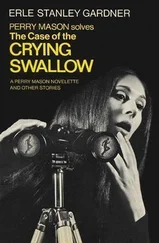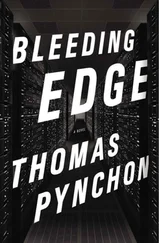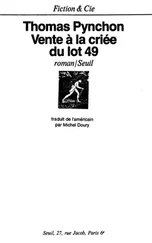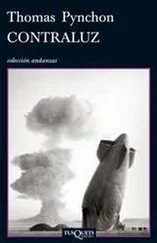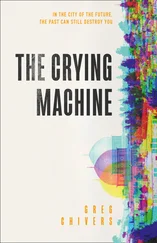"It's mental work," Koteks said, "But not work in the thermodynamic sense." He went on to tell how the Nefastis Machine contained an honest-to-God Maxwell's Demon. All you had to do was stare at the photo of Clerk Maxwell, and concentrate on which cylinder, right or left, you wanted the Demon to raise the temperature in. The air would expand and push a piston. The familiar Society for the Propagation of Christian Knowledge photo, showing Maxwell in right profile, seemed to work best.
Oedipa, behind her shades, looked around carefully, trying not to move her head. Nobody paid any attention to them: the air-conditioning hummed on, IBM typewriters chiggered away, swivel chairs squeaked, fat reference manuals were slammed shut, rattling blueprints folded and refolded, while high overhead the long silent fluorescent bulbs glared merrily; all with Yoyodyne was normal. Except right here, where Oedipa Maas, with a thousand other people to choose from, had had to walk uncoerced into the presence of madness.
"Not everybody can work it, of course," Koteks, having warmed to his subject, was telling her. "Only people with the gift. 'Sensitives,' John calls them."
Oedipa rested her shades on her nose and batted her eyelashes, figuring to coquette her way off this conversational hook: "Would I make a good sensitive, do think?"
"You really want to try it? You could write to him. He only knows a few sensitives. He'd let you try." Oedipa took out her little memo book and opened to the symbol she'd copied and the words Shall I project a world? "Box 573," said Koteks. "In Berkeley."
"No," his voice gone funny, so that she looked up, too sharply, by which time, carried by a certain momentum of thought, he'd also said, "In San Francisco; there's none-" and by then knew he'd made a mistake. "He's living somewhere along Telegraph," he muttered. "I gave you the wrong address."
She took a chance: "Then the WASTE address isn't good any more." But she'd pronounced it like a word, waste. His face congealed, a mask of distrust. "It's W.A.S.T.E., lady," he told her, "an acronym, not 'waste,' and we had best not go into it any further."
"I saw it in a ladies' John," she confessed. But Stanley Koteks was no longer about to be sweet-talked.
"Forget it," he advised; opened a book and proceeded to ignore her.
She in her turn, clearly, was not about to forget it. The envelope she'd seen Koteks doodling what she'd begun to think of as the "WASTE symbol" on had come, she bet, from John Nefastis. Or somebody like him. Her suspicions got embellished by, of all people, Mike Fallopian of the Peter Pinguid Society.
"Sure this Koteks is part of some underground," he told her a few days later, "an underground of the unbalanced, possibly, but then how can you blame them for being maybe a little bitter? Look what's happening to them. In school they got brainwashed, like all of us, into believing the Myth of the American Inventor-Morse and his telegraph, Bell and his telephone, Edison and his light bulb, Tom Swift and his this or that. Only one man per invention. Then when they grew up they found they had to sign over all their rights to a monster like Yoyodyne; got stuck on some 'project' or 'task force' or 'team' and started being ground into anonymity. Nobody wanted them to invent -only perform their little role in a design ritual, already set down for them in some procedures handbook. What's it like, Oedipa, being all alone in a nightmare like that? Of course they stick together, they keep in touch. They can always tell when they come on another of their kind. Maybe it only happens once every five years, but still, immediately, they know."
Metzger, who'd come along to The Scope that evening, wanted to argue. "You're so right-wing you're left-wing," he protested. "How can you be against a corporation that wants a worker to waive his patent rights. That sounds like the surplus value theory to me, fella, and you sound like a Marxist." As they got drunker this typical Southern California dialogue degenerated further. Oedipa sat alone and gloomy. She'd decided to come tonight to The Scope not only because of the encounter with Stanley Koteks, but also because of other revelations; because it seemed that a pattern was beginning to emerge, having to do with the mail and how it was delivered.
There had been the bronze historical marker on the other side of the lake at Fangoso Lagoons. On this site, it read, in 1853, a dozen Wells, Fargo men battled gallantly with a band of masked marauders in mysterious "black uniforms. We owe this description to a post rider, the only witness to the massacre, who died shortly after. The only other clue was a cross, traced by one of the victims in the dust. To this day the identities of the slayers remain shrouded in mystery.
A cross? Or the initial T? The same stuttered by Niccoló in The Courier's Tragedy. Oedipa pondered this. She called Randolph Driblette from a pay booth, to see it he'd known about this Wells, Fargo incident; if that was why he'd chosen to dress his bravos all in black. The phone buzzed on and on, into hollowness. She hung up and headed for Zapf's Used Books. Zapf himself came forward out of a wan cone of 15-watt illumination to help her find the paperback Driblette had mentioned, Jacobean Revenge Plays.
"It's been very much in demand," Zapf told her. The skull on the cover watched them, through the dim light.
Did he only mean Driblette? She opened her mouth to ask, but didn't. It was to be the first of many demurs.
Back at Echo Courts, Metzger in L.A. for the day on other business, she turned immediately to the single mention of the word Trystero. Opposite the line she read, in pencil, Cf. variant, 1687 ed. Put there maybe by some student. In a way, it cheered her. Another reading of that line might help light further the dark face of the word. According to a short preface, the text had been taken from a folio edition, undated. Oddly, the preface was unsigned. She checked the copyright page and found that the original hardcover had been a textbook, Plays of Ford, Webster, Toumeur and Wharfinger, published by The Lectern Press, Berkeley, California, back in 1957. She poured herself half a tumbler of Jack Daniels (the Paranoids having left them a fresh bottle the evening before) and called the L.A. library. They checked, but didn't have the hardcover. They could look it up on inter-library loan for her. "Wait," she said, having just got an idea, "the publisher's up in Berkeley. Maybe I'll try them directly." Thinking also that she could visit John Nefastis.
She had caught sight of the historical marker only because she'd gone back, deliberately, to Lake Invera-rity one day, owing to this, what you might have to call, growing obsession, with "bringing something of herself" -even if that something was just her presence-to the scatter of business interests that had survived Inverar-ity. She would give them order, she would create constellations; next day she drove out to Vesperhaven House, a home for senior citizens that Inverarity had put up around the time Yoyodyne came to San Narciso. In its front recreation room she found sunlight coming in it seemed through every window; an old man nodding in front of a dim Leon Schlesinger cartoon show on the tube; and a black fly browsing along the pink, dandruffy arroyo of the neat part in the old man's hair. A fat nurse ran in with a can of bug spray and yelled at the fly to take off so she could kill it. The cagy fly stayed where it was. "You're bothering Mr Thoth," she yelled at the little fellow. Mr Thoth jerked awake, jarring loose the fly, which made a desperate scramble for the door. The nurse pursued, spraying poison. "Hello," said Oedipa.
"I was dreaming," Mr Thoth told her, "about my grandfather. A very old man, at least as old as I am now, 91. I thought, when I was a boy, that he had been 91 all his life. Now I feel," laughing, "as if I have been 91 all my life. Oh, the stories that old man would tell. He rode for the Pony Express, back in the gold rush days. His horse was named Adolf, I remember that."
Читать дальше


